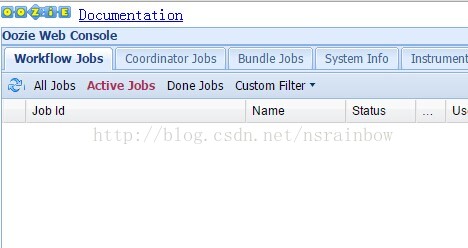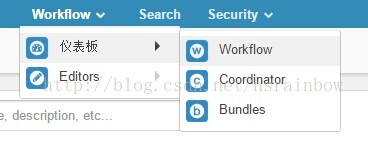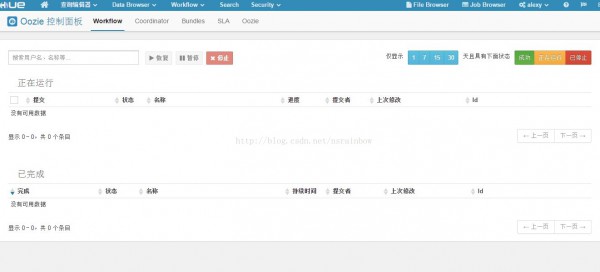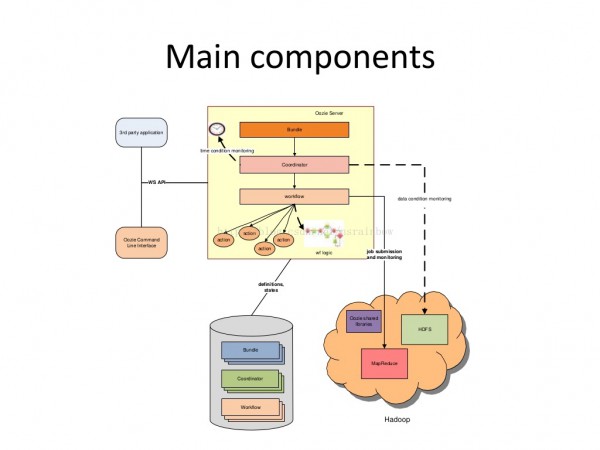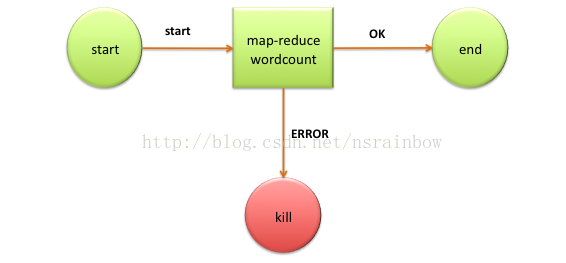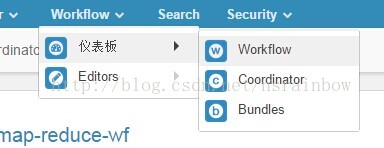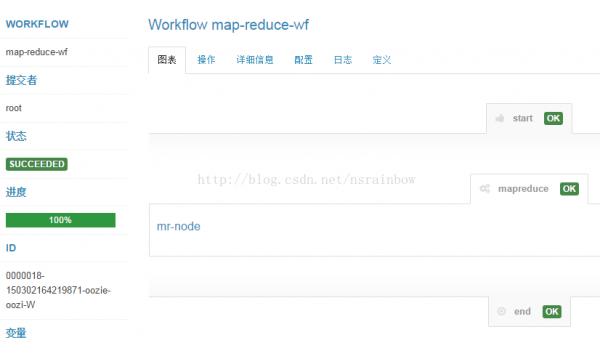Alex 的 Hadoop 菜鸟教程: 第20课 工作流引擎 Oozie
来源:程序员人生 发布时间:2015-03-30 08:35:05 阅读次数:6693次
本文基于 Centos6.x + CDH5.x
Oozie是甚么
简单的说Oozie是1个工作流引擎。只不过它是1个基于Hadoop的工作流引擎,在实际工作中,遇到对数据进行1连串的操作的时候很实用,不需要自己写1些处理代码了,只需要定义好各个action,然后把他们串在1个工作流里面就能够自动履行了。对大数据的分析工作非常有用
安装Oozie
Oozie分为服务端和客户端,我现在选择host1作为服务端,host2作为客户端。
所以在host1上运行
yum install oozie
在host2上运行
yum install oozie-client
配置Oozie
配置Oozie使用的MapReduce版本,MapReduce版本有两个1个是 MRv1 和 YARN。由于我们选择的是YARN,而且我为了方便上手暂时不用SSL,所以切换成不带SSL并且使用YARN
alternatives --set oozie-tomcat-conf /etc/oozie/tomcat-conf.http
设置Oozie使用的数据库
这里提到的
数据库是关系型
数据库,用来存储Oozie的数据。Oozie自带1个Derby,不过Derby只能拿来实验的玩玩,不能上战场的。这里我选择mysql作为Oozie的
数据库我假定你已安装好了mysql
数据库,接下来就是创建Oozie用的
数据库$ mysql -u root -p
Enter password: ******
mysql> create database oozie;
Query OK, 1 row affected (0.03 sec)
mysql> grant all privileges on oozie.* to 'oozie'@'localhost' identified by 'oozie';
Query OK, 0 rows affected (0.03 sec)
mysql> grant all privileges on oozie.* to 'oozie'@'%' identified by 'oozie';
Query OK, 0 rows affected (0.03 sec)
编辑 oozie-site.xml 配置mysql的连接属性
<property>
<name>oozie.service.JPAService.jdbc.driver</name>
<value>com.mysql.jdbc.Driver</value>
</property>
<property>
<name>oozie.service.JPAService.jdbc.url</name>
<value>jdbc:mysql://localhost:3306/oozie</value>
</property>
<property>
<name>oozie.service.JPAService.jdbc.username</name>
<value>oozie</value>
</property>
<property>
<name>oozie.service.JPAService.jdbc.password</name>
<value>oozie</value>
</property>
把mysql的jdbc驱动做1个软链到 /var/lib/oozie/
$ sudo yum install mysql-connector-java
$ ln -s /usr/share/java/mysql-connector-java.jar /var/lib/oozie/mysql-connector-java.jar
第1行,如果你已装过 mysql-connector-java 可以跳过这步
创建oozie需要的表结构
$ sudo -u oozie /usr/lib/oozie/bin/ooziedb.sh create -run
打开Web控制台
Step1
Oozie使用的是ExtJs,所以得先下载1个ext http://archive.cloudera.com/gplextras/misc/ext⑵.2.zip
Step2
解压开 ext⑵.2.zip 并拷贝到 /var/lib/oozie.
# unzip ext⑵.2.zip
# mv ext⑵.2 /var/lib/oozie/
在HDFS上安装Oozie库
为oozie分配hdfs的权限,编辑所有机器上的 /etc/hadoop/conf/core-site.xml ,增加以下配置
<property>
<name>hadoop.proxyuser.oozie.hosts</name>
<value>*</value>
</property>
<property>
<name>hadoop.proxyuser.oozie.groups</name>
<value>*</value>
</property>
并重启hadoop的service(namenode 和 datanode 就好了)
拷贝Oozie的Jars到HDFS,让DistCp, Pig, Hive, and Sqoop 可以调用
$ sudo -u hdfs hadoop fs -mkdir /user/oozie
$ sudo -u hdfs hadoop fs -chown oozie:oozie /user/oozie
$ sudo oozie-setup sharelib create -fs hdfs://mycluster/user/oozie -locallib /usr/lib/oozie/oozie-sharelib-yarn.tar.gz
这里的mycluster请自行替换成你的clusterId
启动Oozie
$ sudo service oozie start
使用Oozie
连接Oozie的方法
连接Oozie有3个方法
用客户端连接
由于我的client端装在了host2上,所以在host2上运行
$ oozie admin -oozie http://host1:11000/oozie -status
System mode: NORMAL
为了方便,不用每次都输入oozie-server所在
服务器,我们可以设置环境变量
$ export OOZIE_URL=http://host1:11000/oozie
$ oozie admin -version
Oozie server build version: 4.0.0-cdh5.0.0
用阅读器访问
打开阅读器访问 http://host1:11000/oozie
用HUE访问
上节课我们讲了HUE的使用,现在可以在hue里面配置上Oozie的参数。用HUE来使用Oozie。
编辑 /etc/hue/conf/hue.init 找到 oozie_url 这个属性,修改成真实地址
[liboozie]
# The URL where the Oozie service runs on. This is required in order for
# users to submit jobs. Empty value disables the config check.
oozie_url=http://host1:11000/oozie
重启hue服务
访问hue中的oozie模块
点击 Workflow 可以看到工作流界面
Oozie的3个概念
Oozie有3个主要概念
- workflow 工作流
- coordinator 多个workflow可以组成1个coordinator,可以把前几个workflow的输出作为后1个workflow的输入,也能够定义workflow的触发条件,来做定时触发
- bundle 是对1堆coordinator的抽象
以下这幅图解释了Oozie组件之间的关系
hPDL
oozie采取1种叫 hPDL的xml规范来定义工作流。
这是1个wordcount版本的hPDL的xml例子
<workflow-app name='wordcount-wf' xmlns="uri:oozie:workflow:0.1">
<start to='wordcount'/>
<action name='wordcount'>
<map-reduce>
<job-tracker>${jobTracker}</job-tracker>
<name-node>${nameNode}</name-node>
<configuration>
<property>
<name>mapred.mapper.class</name>
<value>org.myorg.WordCount.Map</value>
</property>
<property>
<name>mapred.reducer.class</name>
<value>org.myorg.WordCount.Reduce</value>
</property>
<property>
<name>mapred.input.dir</name>
<value>${inputDir}</value>
</property>
<property>
<name>mapred.output.dir</name>
<value>${outputDir}</value>
</property>
</configuration>
</map-reduce>
<ok to='end'/>
<error to='end'/>
</action>
<kill name='kill'>
<message>Something went wrong: ${wf:errorCode('wordcount')}</message>
</kill/>
<end name='end'/>
</workflow-app>
这个例子可以用以下这幅图表示
1个oozie job的组成
1个oozie 的 job 1般由以下文件组成
- job.properties 记录了job的属性
- workflow.xml 使用hPDL 定义任务的流程和分支
- class 文件,用来履行具体的任务
任务启动的命令1般长这模样
$ oozie job -oozie http://localhost:11000/oozie -config examples/apps/map-reduce/job.properties -run
可以看到 任务开始是通过调用 oozie job 命令并传入oozie
服务器地址和 job.properties 的路径开始。job.properties 是1个任务的履行入口
做个MapReduce例子
这里使用官方提供的例子。
Step1
在 host1 上下载oozie包
wget http://apache.fayea.com/oozie/4.1.0/oozie⑷.1.0.tar.gz
解压开,里面有1个 examples文件夹,我们将这个文件夹拷贝到别的地方,并改名为
oozie-examples 进入这个文件夹,然后修改pom.xml,在plugins里面增加1个plugin
<plugin>
<groupId>org.apache.maven.plugins</groupId>
<artifactId>maven-surefire-plugin</artifactId>
<version>2.5</version>
<configuration>
<skipTests>false</skipTests>
<testFailureIgnore>true</testFailureIgnore>
<forkMode>once</forkMode>
</configuration>
</plugin>
然后运行 mvn package 可以看到 target 文件夹下有 oozie-examples⑷.1.0.jar
Step2
编辑 oozie-examples/src/main/apps/map-reduce/job.properties
修改 namenode为hdfs 的namenode地址,由于我们是搭成ha模式,所以写成 hdfs://mycluster 。修改 jobTracker为 resoucemanager 所在的地址,这边为 host1:8032
改完后的 job.properties 长这样
nameNode=hdfs://mycluster
jobTracker=host1:8032
queueName=default
examplesRoot=examples
oozie.wf.application.path=${nameNode}/user/${user.name}/${examplesRoot}/apps/map-reduce
outputDir=map-reduce
这里的 user.name 就是你运行oozie的linux 用户名,我用的是root,所以最后的路径会变成 hdfs://mycluster/user/root/examples/apps/map-reduce
Step3
根据上面配置的路径,我们在hdfs上先建立出 /user/root/examples/apps/map-reduce/ 目录
hdfs dfs -mkdir -p /user/root/examples/apps/map-reduce
然后把 src/main/apps/map-reduce/workflow.xml 传到 /user/root/examples/apps/map-reduce 下面
hdfs dfs -put oozie-examples/src/main/apps/map-reduce/workflow.xml /user/root/examples/apps/map-reduce/
在 /user/root/examples/apps/map-reduce/ 里面建立 lib 文件夹,并把 打包好的 oozie-examples⑷.1.0.jar 上传到这个目录下
hdfs dfs -mkdir /user/root/examples/apps/map-reduce/lib
hdfs dfs -put oozie-examples/target/oozie-examples⑷.1.0.jar /user/root/examples/apps/map-reduce/lib
在hdfs上建立 /examples 文件夹
sudo -u hdfs hdfs dfs -mkdir /examples
把examples 文件夹里面的 srcmainapps 文件夹传到这个文件夹底下
hdfs dfs -put examples/src/main/apps /examples
建立输出跟输入文件夹并上传测试数据
hdfs dfs -mkdir -p /user/root/examples/input-data/text
hdfs dfs -mkdir -p /user/root/examples/output-data
hdfs dfs -put oozie-examples/src/main/data/data.txt /user/root/examples/input-data/text
Step4
运行这个任务
oozie job -oozie http://host1:11000/oozie -config oozie-examples/src/main/apps/map-reduce/job.properties -run
任务创建成功后会返回1个job号比如 job: 0000017⑴50302164219871-oozie-oozi-W
然后你可以采取之条件供的 3 个连接oozie 的方法去查询任务状态,这里我采取HUE去查询的情况,点击最上面的 Workflow -> 仪表盘 -> Workflow
会看到有1个任务正在运行
点击后,可以实时的看任务状态,完成后会变成SUCCESS
这时候候去看下结果 /user/root/examples/output-data/map-reduce/part-00000
0 To be or not to be, that is the question;
42 Whether 'tis nobler in the mind to suffer
84 The slings and arrows of outrageous fortune,
129 Or to take arms against a sea of troubles,
172 And by opposing, end them. To die, to sleep;
217 No more; and by a sleep to say we end
255 The heart-ache and the thousand natural shocks
302 That flesh is heir to ? 'tis a consummation
346 Devoutly to be wish'd. To die, to sleep;
387 To sleep, perchance to dream. Ay, there's the rub,
438 For in that sleep of death what dreams may come,
487 When we have shuffled off this mortal coil,
531 Must give us pause. There's the respect
571 That makes calamity of so long life,
608 For who would bear the whips and scorns of time,
657 Th'oppressor's wrong, the proud man's contumely,
706 The pangs of despised love, the law's delay,
751 The insolence of office, and the spurns
791 That patient merit of th'unworthy takes,
832 When he himself might his quietus make
871 With a bare bodkin? who would fardels bear,
915 To grunt and sweat under a weary life,
954 But that the dread of something after death,
999 The undiscovered country from whose bourn
1041 No traveller returns, puzzles the will,
1081 And makes us rather bear those ills we have
1125 Than fly to others that we know not of?
1165 Thus conscience does make cowards of us all,
1210 And thus the native hue of resolution
1248 Is sicklied o'er with the pale cast of thought,
1296 And enterprises of great pitch and moment
1338 With this regard their currents turn awry,
1381 And lose the name of action.
workflow.xml解析
我们把刚刚这个例子里面的workflow.xml打开看下
<workflow-app xmlns="uri:oozie:workflow:0.2" name="map-reduce-wf">
<start to="mr-node"/>
<action name="mr-node">
<map-reduce>
<job-tracker>${jobTracker}</job-tracker>
<name-node>${nameNode}</name-node>
<prepare>
<delete path="${nameNode}/user/${wf:user()}/${examplesRoot}/output-data/${outputDir}"/>
</prepare>
<configuration>
<property>
<name>mapred.job.queue.name</name>
<value>${queueName}</value>
</property>
<property>
<name>mapred.mapper.class</name>
<value>org.apache.oozie.example.SampleMapper</value>
</property>
<property>
<name>mapred.reducer.class</name>
<value>org.apache.oozie.example.SampleReducer</value>
</property>
<property>
<name>mapred.map.tasks</name>
<value>1</value>
</property>
<property>
<name>mapred.input.dir</name>
<value>/user/${wf:user()}/${examplesRoot}/input-data/text</value>
</property>
<property>
<name>mapred.output.dir</name>
<value>/user/${wf:user()}/${examplesRoot}/output-data/${outputDir}</value>
</property>
</configuration>
</map-reduce>
<ok to="end"/>
<error to="fail"/>
</action>
<kill name="fail">
<message>Map/Reduce failed, error message[${wf:errorMessage(wf:lastErrorNode())}]</message>
</kill>
<end name="end"/>
</workflow-app>
最重要的就是里面的action 节点。
中间那段action 可以有支持几种类型的action
- Map-Reduce Action
- Pig Action
- Fs(HDFS) Action
- Java Action
- Email Action
- Shell Action
- Hive Action
- Sqoop Action
- Ssh Action
- DistCp Action
- 自定义Action
- sub-workflow (这个可以嵌套另外1个workflow.xml文件的路径)
具体见 http://oozie.apache.org/docs/4.1.0/WorkflowFunctionalSpec.html#a3.2_Workflow_Action_Nodes
这个简单的map-reduce 其实甚么也没干,只是把文本1行的读取并打印出来。接下来我要把这个例子改成我们熟习的WordCount例子
WordCount例子
Step1
先改1下我们的Mapper 和 Reducer 代码
修改SampleMapper为
package org.apache.oozie.example;
import java.io.IOException;
import java.util.StringTokenizer;
import org.apache.hadoop.io.IntWritable;
import org.apache.hadoop.io.LongWritable;
import org.apache.hadoop.io.Text;
import org.apache.hadoop.mapreduce.Mapper;
public class SampleMapper extends Mapper<LongWritable, Text, Text, IntWritable> {
private final static IntWritable one = new IntWritable(1);
private Text word = new Text();
public void map(LongWritable key, Text value, Context context)
throws IOException, InterruptedException {
String line = value.toString();
StringTokenizer tokenizer = new StringTokenizer(line);
while (tokenizer.hasMoreTokens()) {
word.set(tokenizer.nextToken());
context.write(word, one);
}
}
}
然后再把Reducer修改成
package org.apache.oozie.example;
import java.io.IOException;
import org.apache.hadoop.io.IntWritable;
import org.apache.hadoop.io.Text;
import org.apache.hadoop.mapreduce.Reducer;
public class SampleReducer extends Reducer<Text, IntWritable, Text, IntWritable> {
public void reduce(Text key, Iterable<IntWritable> values, Context context)
throws IOException, InterruptedException {
int sum = 0;
for (IntWritable val : values) {
sum += val.get();
}
context.write(key, new IntWritable(sum));
}
}
改好后用 mvn clean package 打包好,还是上传到 /user/root/examples/apps/map-reduce/lib 覆盖之前的那份jar
这边说1点题外话,关于MapReduce的old API跟new API的区分,这个跟我们这次的教程没关系,如果不感兴趣的同学可以直接跳过下面这1段
MapReduce 的 old API 跟 new API 区分
mapreduce 分为 old api 和 new api , new api废弃了 org.apache.hadoop.mapred 包下的 Mapper 和 Reducer,新增了org.apache.hadoop.mapreduce包,如果你手头有用旧api写的mp(mapreduce)任务可以通过以下几个改动修改成新的mp写法
- 将implements Mapper/Reducer 改成 extends Mapper/Reducer,由于new API 里 Mapper 和 Reducer不是接口,并且包的位置变成 org.apache.hadoop.mapreduce.Mapper
- OutputCollector 改成 Context
- map方法改成 map(LongWritable key, Text value, Context context) reduce 方法改成
具体见 Hadoop WordCount with new map reduce api
Step2
我们把之前的 src/main/apps/map-reduce/workflow.xml 修改1下成为这样
<workflow-app xmlns="uri:oozie:workflow:0.2" name="map-reduce-wf">
<start to="mr-node"/>
<action name="mr-node">
<map-reduce>
<job-tracker>${jobTracker}</job-tracker>
<name-node>${nameNode}</name-node>
<prepare>
<delete path="${nameNode}/user/${wf:user()}/${examplesRoot}/output-data/${outputDir}"/>
</prepare>
<configuration>
<property>
<name>mapred.mapper.new-api</name>
<value>true</value>
</property>
<property>
<name>mapred.reducer.new-api</name>
<value>true</value>
</property>
<property>
<name>mapred.output.key.class</name>
<value>org.apache.hadoop.io.Text</value>
</property>
<property>
<name>mapred.output.value.class</name>
<value>org.apache.hadoop.io.IntWritable</value>
</property>
<property>
<name>mapreduce.inputformat.class</name>
<value>org.apache.hadoop.mapreduce.lib.input.TextInputFormat</value>
</property>
<property>
<name>mapreduce.outputformat.class</name>
<value>org.apache.hadoop.mapreduce.lib.output.TextOutputFormat</value>
</property>
<property>
<name>mapred.job.queue.name</name>
<value>${queueName}</value>
</property>
<property>
<name>mapreduce.map.class</name>
<value>org.apache.oozie.example.SampleMapper</value>
</property>
<property>
<name>mapreduce.reduce.class</name>
<value>org.apache.oozie.example.SampleReducer</value>
</property>
<property>
<name>mapred.map.tasks</name>
<value>1</value>
</property>
<property>
<name>mapred.input.dir</name>
<value>/user/${wf:user()}/${examplesRoot}/input-data/text</value>
</property>
<property>
<name>mapred.output.dir</name>
<value>/user/${wf:user()}/${examplesRoot}/output-data/${outputDir}</value>
</property>
</configuration>
</map-reduce>
<ok to="end"/>
<error to="fail"/>
</action>
<kill name="fail">
<message>Map/Reduce failed, error message[${wf:errorMessage(wf:lastErrorNode())}]</message>
</kill>
<end name="end"/>
</workflow-app>
我把中间的action 里面的属性替换了,我说明1下几个重要属性
- mapred.mapper.new-api 和 mapred.reducer.new-api 意思是是不是要使用new API,我们这边设置为true
- mapred.output.key.class 和 mapred.output.value.class 意思是 mapper的输出类型
- mapreduce.map.class 和 mapreduce.reduce.class 这两处连属性名都修改了,可能很多人会发现不了,之前是 mapred.mapper.class 和 mapred.reducer.class ,如果你只改了value就会出错,说new API的属性里面没有这两个属性
然后我们把workflow.xml上传到hdfs上
hdfs dfs -put -f oozie-examples/src/main/apps/map-reduce/workflow.xml /user/root/examples/apps/map-reduce/
Step3
我们把素材准备1下,还是之前做 wordcount 用的 file0 和 file1
$ echo "Hello World Bye World" > file0
$ echo "Hello Hadoop Goodbye Hadoop" > file1
$ hdfs dfs -put file* /user/root/examples/input-data/text
顺便把之前的data.txt删掉
hdfs dfs -rm /user/root/examples/input-data/text/data.txt
Step4
我们来运行1下这个job
oozie job -oozie http://host1:11000/oozie -config oozie-examples/src/main/apps/map-reduce/job.properties -run
履行完后到 / user/ root/ examples/ output-data/ map-reduce/ part-r-00000 查看我们的结果
Bye 1
Goodbye 1
Hadoop 2
Hello 2
World 2
完成!
参考资料
- http://www.infoq.com/cn/articles/introductionOozie
- http://www.infoq.com/cn/articles/oozieexample
- https://github.com/yahoo/oozie/wiki/Oozie-Coord-Use-Cases
- https://oozie.apache.org/docs/3.1.3-incubating/CoordinatorFunctionalSpec.html#a2._Definitions
- http://oozie.apache.org/docs/4.1.0/DG_Examples.html
- https://github.com/jrkinley/oozie-examples
- http://codesfusion.blogspot.com/2013/10/hadoop-wordcount-with-new-map-reduce-api.html
- https://support.pivotal.io/hc/en-us/articles/203355837-How-to-run-a-Map-Reduce-jar-using-Oozie-workflow
生活不易,码农辛苦
如果您觉得本网站对您的学习有所帮助,可以手机扫描二维码进行捐赠

